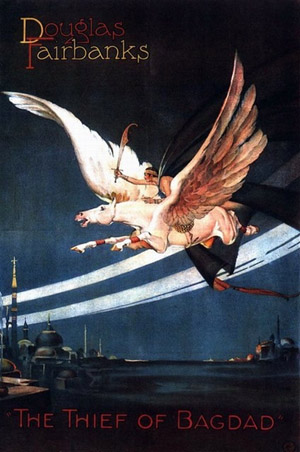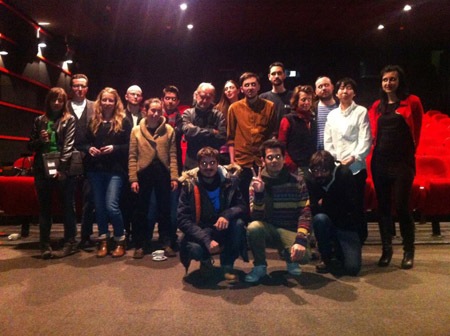“Raymond Rohauer: King of the Film Freebooters” is a fascinating portrait of a wildly controversial film collector and distributor by William K. Everson, the writer, archivist, and film historian. Rohauer died in 1987, Everson in 1996, and both their legacies live on, albeit in very different fashions. Commenting at Dave Kehr‘s place, Robert Garrick notes that “Rohauer was a fascinating character—eccentric, ruthless, and hated by many. Kevin Brownlow, as courtly a man as walks the earth, called Rohauer a ‘pirate.’ It’s almost enough to recall Robert Mitchum’s line about Jane Greer in Out of the Past, after someone said: ‘Nobody is all bad.’ Mitchum rejoindered: ‘She comes the closest.’ Yet now that Rohauer has been dead for a quarter century, we have hundreds of valuable films in one place, ready for preservation and projection. I’ll bet at least a few dozen of those films would be gone without Rohauer.”
The occasion for this revived interest is Kehr’s original entry in which he notes that a “very handsome 2K restoration of Douglas Fairbanks‘s 1924 The Thief of Bagdad“—which screened a little over a week ago at San Francisco’s Silent Winter—”is the first library release from the Cohen Media Group, a new distributor that has acquired the rights to what was once known as the Raymond Rohauer Collection. Among the 600 or so other titles in the collection are quite a few treasures that have remained buried because the source material needs some major restoration; here’s hoping that Charles Cohen, the CEO of the new company, will be continue the fine work in evidence here with, for example, Frank Borzage‘s 1925 The Lady, William K. Howard’s 1926 Gigolo and Roland West’s 1928 The Dove, just to pick a few of the more tantalizing titles in the catalog.”
From Kehr‘s review of the new release in the New York Times: “As the producer of his films and the author (under the pseudonym Elton Thomas) of many of his screenplays Fairbanks was the dominant creative force behind his vehicles, although he had two collaborators of distinction on Thief. The film’s extraordinary production design—located somewhere between the swoony Art Nouveau curves of Aubrey Beardsley and the robust literary illustrations of N.C. Wyeth—is the first major work of William Cameron Menzies, a brilliant jack-of-all-trades who would leave his mark on movies from Gone With the Wind (which he designed) to the low-budget nightmare Invaders from Mars (which he also directed). The director of record is Raoul Walsh, one of the leading figures of the era (as he would remain, with films like High Sierra and White Heat, well into the ’50s), but here, as Walsh admitted in his autobiography, he was happy to function as a facilitator for Fairbanks and Menzies.”
Each week at Sundance NOW, Michael Koresky looks back a particular year in film history in his column “Here & Now & Then.” This week, the year is 1928, and among the characters making a showing are Louis Wolheim, Lewis Milestone, Emil Jannings, Josef von Sternberg, and Paul Fejos.
Just Another Film Buff revisits Ernst Lubitsch‘s To Be Or Not To Be (1942), “a coup de grâce from the greatest weapon that the Allies possessed: Hollywood.”
Fernando F. Croce‘s “Movie of the Day” is David Cronenberg’s Rabid (1977).
In other news. Classes have begun at Béla Tarr‘s new Film Factory at the Sarajevo University School for Science and Technology. For Reuters, Daria Sito-Sucic talks with Tarr and cinematographer Fred Kelemen about their goals: “The program includes a theoretical section based on analyzing films as well as practical workshops which will be run by independent cinema stars including Aki Kaurismäki, Gus Van Sant, Jim Jarmusch and Tilda Swinton. Students [there are 17] are expected to produce four films over the first two years and a feature in the final year.”
“The economics of the film industry are changing,” reports the Economist. Sales of tickets and DVDs are down, but the costs of making movies is going up. “Meanwhile, television, once the unglamorous sister, is enjoying record earnings and unprecedented critical acclaim.”
“Pornography & Sex in the Cinema” is the theme of the new issue of One+One Filmmakers Journal.
In the works. “Marion Cotillard has signed to star in the Dardenne brothers’ upcoming feature Two Days, One Night (Deux jours, une nuit), about a young woman who has to convince her colleagues to renounce their annual bonuses so she can keep her job,” reports Screen‘s Melanie Goodfellow.
Oscars. We’ll no doubt be sorting through the aftermath of last night’s Oscars for a few days at least—see, for example, the Guardian‘s Peter Bradshaw and the New Yorker‘s Richard Brody—but, perhaps more happily, we’ll carry on debating the merits of the nominated films far longer. Yesterday, Argo and Zero Dark Thirty were the hot topics. Today, I’ll point you to two pieces on Silver Linings Playbook, the big winner at the Spirit Awards: Otie Wheeler‘s in the Notebook and a conversation in the Morning News between David Haglund, Pasha Malla, and Michelle Orange. Haglund kicks it off: “I’m confused as to why nobody—I’m thinking not just of you two, but of every critic whose review I’ve read, having by now read several of them, confused, again and again—is talking about how totally bizarre this movie is. Perhaps that’s because it is, in certain respects, a meticulously conventional movie; it absolutely deploys ‘the rom-com formula.’ But within those considerable constraints it gets very strange.”
For news and tips throughout the day every day, follow @KeyframeDaily on Twitter and/or the RSS feed. Get Keyframe Daily in your inbox by signing in at fandor.com/daily.





